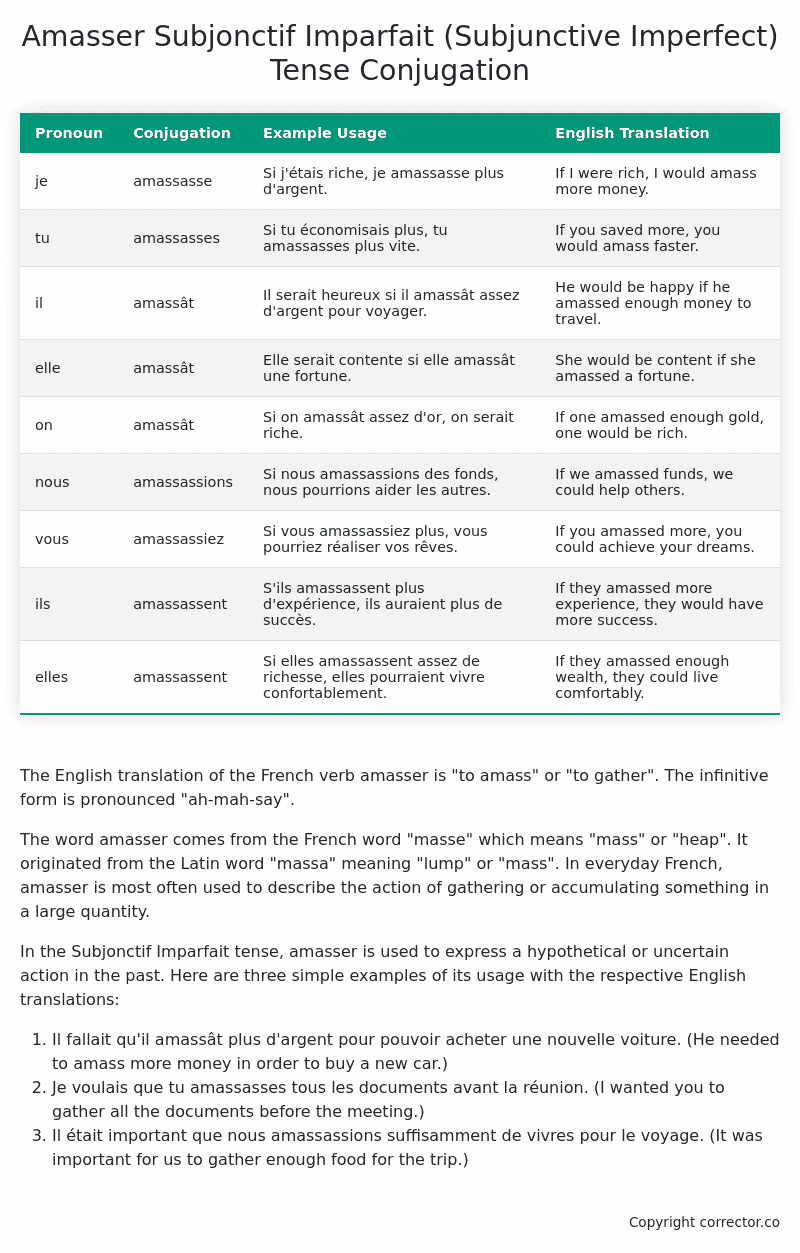Subjonctif Imparfait (Subjunctive Imperfect) Tense Conjugation of the French Verb amasser
Introduction to the verb amasser
The English translation of the French verb amasser is “to amass” or “to gather”. The infinitive form is pronounced “ah-mah-say”.
The word amasser comes from the French word “masse” which means “mass” or “heap”. It originated from the Latin word “massa” meaning “lump” or “mass”. In everyday French, amasser is most often used to describe the action of gathering or accumulating something in a large quantity.
In the Subjonctif Imparfait tense, amasser is used to express a hypothetical or uncertain action in the past. Here are three simple examples of its usage with the respective English translations:
- Il fallait qu’il amassât plus d’argent pour pouvoir acheter une nouvelle voiture. (He needed to amass more money in order to buy a new car.)
- Je voulais que tu amassasses tous les documents avant la réunion. (I wanted you to gather all the documents before the meeting.)
- Il était important que nous amassassions suffisamment de vivres pour le voyage. (It was important for us to gather enough food for the trip.)
Table of the Subjonctif Imparfait (Subjunctive Imperfect) Tense Conjugation of amasser
| Pronoun | Conjugation | Example Usage | English Translation |
|---|---|---|---|
| je | amassasse | Si j’étais riche, je amassasse plus d’argent. | If I were rich, I would amass more money. |
| tu | amassasses | Si tu économisais plus, tu amassasses plus vite. | If you saved more, you would amass faster. |
| il | amassât | Il serait heureux si il amassât assez d’argent pour voyager. | He would be happy if he amassed enough money to travel. |
| elle | amassât | Elle serait contente si elle amassât une fortune. | She would be content if she amassed a fortune. |
| on | amassât | Si on amassât assez d’or, on serait riche. | If one amassed enough gold, one would be rich. |
| nous | amassassions | Si nous amassassions des fonds, nous pourrions aider les autres. | If we amassed funds, we could help others. |
| vous | amassassiez | Si vous amassassiez plus, vous pourriez réaliser vos rêves. | If you amassed more, you could achieve your dreams. |
| ils | amassassent | S’ils amassassent plus d’expérience, ils auraient plus de succès. | If they amassed more experience, they would have more success. |
| elles | amassassent | Si elles amassassent assez de richesse, elles pourraient vivre confortablement. | If they amassed enough wealth, they could live comfortably. |
Other Conjugations for Amasser.
Le Present (Present Tense) Conjugation of the French Verb amasser
Imparfait (Imperfect) Tense Conjugation of the French Verb amasser
Passé Simple (Simple Past) Tense Conjugation of the French Verb amasser
Passé Composé (Present Perfect) Tense Conjugation of the French Verb amasser
Futur Simple (Simple Future) Tense Conjugation of the French Verb amasser
Futur Proche (Near Future) Tense Conjugation of the French Verb amasser
Plus-que-parfait (Pluperfect) Tense Conjugation of the French Verb amasser
Passé Antérieur (Past Anterior) Tense Conjugation of the French Verb amasser
Futur Antérieur (Future Anterior) Tense Conjugation of the French Verb amasser
Subjonctif Présent (Subjunctive Present) Tense Conjugation of the French Verb amasser
Subjonctif Passé (Subjunctive Past) Tense Conjugation of the French Verb amasser
Subjonctif Imparfait (Subjunctive Imperfect) Tense Conjugation of the French Verb amasser (this article)
Subjonctif Plus-que-parfait (Subjunctive Pluperfect) Tense Conjugation of the French Verb amasser
Conditionnel Présent (Conditional Present) Tense Conjugation of the French Verb amasser
Conditionnel Passé (Conditional Past) Tense Conjugation of the French Verb amasser
L’impératif Présent (Imperative Present) Tense Conjugation of the French Verb amasser
L’infinitif Présent (Infinitive Present) Tense Conjugation of the French Verb amasser
Struggling with French verbs or the language in general? Why not use our free French Grammar Checker – no registration required!
Get a FREE Download Study Sheet of this Conjugation 🔥
Simply right click the image below, click “save image” and get your free reference for the amasser Subjonctif Imparfait tense conjugation!

Amasser – About the French Subjonctif Imparfait (Subjunctive Imperfect) Tense
Formation
Common Everyday Usage Patterns
Interactions with Other Tenses
Subjonctif Présent
Indicatif Passé Composé
Conditional
Conditional Perfect
Summary
I hope you enjoyed this article on the verb amasser. Still in a learning mood? Check out another TOTALLY random French verb conjugation!


